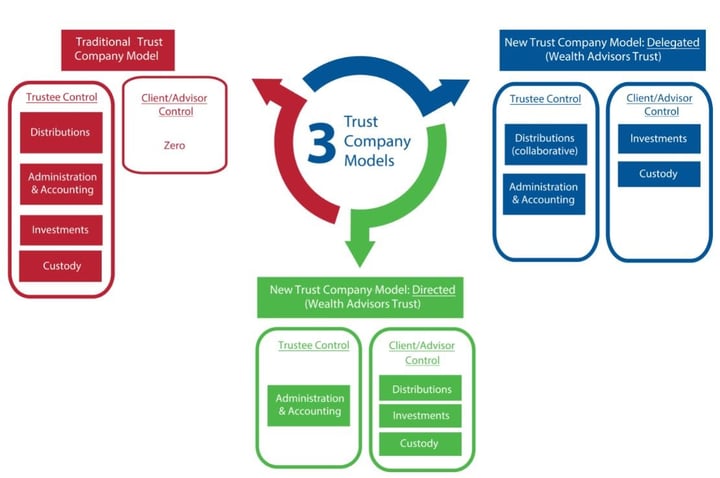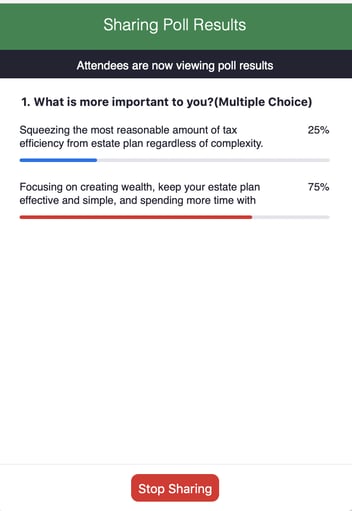This blog post addresses two audiences on estate planning for millennials: (1) financial advisors; and (2) millennials themselves. The information came from an August 2020 presentation Wealth Advisors Trust Company gave uber-successful Millennials wanting to learn the ABCs of estate planning in 15 minutes. Advisors will learn how to serve/prospect to millennials with a broader scope and understanding. Millennials will learn how to think thru the philosophical complexities of estate planning around their wealth and family. This post will include:
- Marketing and client serving ideas to millennial clients
- Action steps on the ABCs of estate planning for millennials (aka estate planning guide)
- Polling data results from wills and estate planning on millennials.
Estate planning for Millennials
An essential estate planning checklist should be offered to any type of client. The uniqueness around those checklists rests on the age, wealth, and surrounding family/business circumstances. Uber-successful millennials exhibit the same stressors as previous generations. The benefits millennials can access - information and knowledge - such as reading this blog or anything related to the internet. The drawback millennials must confront around estate planning worksheets or plans that previous generations could avoid - not confusing information and knowledge with wisdom. Previous generations could access information or knowledge easily. Time and effort were a requirement. The trifecta of information, knowledge, and understanding will have a steeper learning curve for millennials and future generations than past ones.
To know the right questions to ask and when allows for answers to follow in an easy order. Advisors seeing the most considerable client successes around estate planning for millennials or any other type follow an inverted triangle process. If you know the rights questions, the right answers follow quickly in line for estate planning basics or any different financial planning/wealth management topic.
Estate planning questions to ask yourself and/or your spouse
Creating an estate plan starts with a Will and could lead other various trust types. The process begins with broad and philosophical questions. Estate attorneys can do this work, and some are very good at it. The pickle issue becomes how an advisor/millennial knows which estate attorneys are form fillers or, great thinkers, within a pre-subscribed budget. Advisors’ compensation structure allows them time to think broadly and carefully around estate planning concepts and considerations based on philosophical issues and not the rule of law issues.
Below are the results of a poll taken during the presentation given to uber-successful millennials around estate planning.

The poll results above were taken during the discussion around these initial questions. Here is the list of initial questions to ask millennials about estate planning issues. To get the ball rolling:
- Why and how much do we (millennial) want to give to our (their kids) heirs?
- These questions center around their age, wealth, asset type (liquid or illiquid), charity, religion, potential estate tax issues (pre and post 12/31/2025), and current wealth. That covers a wide range of estate planning topics.
- When and where do I want my heirs to receive an inheritance?
- These questions drive to the heart of how these uber-successful millennials define a legacy—the options center on using a trust or giving them the assets outright. The millennial parent can then define trust distributions as either supporting (e.g., cover what life expenses without destroying their self-worth) vs. enabling (e.g., creating trust fund kids). Trust distributions come down to philosophical approaches to money. These millennial parents need to ask themselves how willing are they to let their children fail. Estate planning can become a mess very quickly.
- Do we want the ability to choose who or what entity manages our trust assets?
- Most estate planning attorneys are not uniformly aware that different types of trust companies offer various kinds of control and choice.

Estate planning questions to ask your estate planning attorney
Estate planning attorneys want to provide a smooth and natural process for their clients. Financial planners assisting clients with the estate planning process need to understand the attorneys’ perspective. The law is driven by logic and case law. Attorneys must put actions, dreams, tax plans, etc. all within written language without creating more confusion. Like working with a doctor, knowing the broad questions will help elicit better answers from the attorney and/or financial advisors. Millennials must understand that a Will and potentially other estate planning documents such as Irrevocable Life Insurance Trusts, Grantor Trusts, Charitable Trusts, etc. are not a form. As shown above, the questions are critical. Legal Zoom is garbage.
You should not expect more from your morning coffee than your legal estate planning documents.

These poll results above were asked during the section around questions to ask your estate planning attorney. Here is the list of those questions:
- Why and how much do we (millennial) want to give to our (their kids) heirs?
- Millennials want to understand IRS risk, control from the grave issues, administrative costs during and after your lifetime.
- How can we make the administration of a trust more effective to lower future trustee fees?
- Trust distributions will now be defined much based on the work down above. Remember, a trustee (i.e., individual and/or corporate) need to interpret your intent. You are giving some perspective around your intention to make the workflow faster and trustee fees more efficient.
- What are the downsides to creating a trust during my lifetime, and at my death? Why
- This is a chance to listen and learn. As words or topics are brought-up, keep asking questions.

Big issues to consider and side issues to address around estate planning
Sometimes estate planning is an ongoing process. These uber-successful millennials know that there will be at least two significant estate planning moments and multiple updates—just standard stuff. Many estate planning aspects deal with minor issues.
Three big issues to consider:
- Allow a beneficiary or a majority of beneficiaries, if sharing a trust, to remove and to appoint trustees without a court or judge requirement.
- Allow a current or successor trustee to change the governing law of a trust for situs (i.e., think location) and trust administration without the approval of a beneficiary, court, or judge.
- Executors of a Will need to follow the rules and ask questions for guidance. No shortcuts. Horrible job.
Two side issues to address:
- Review Medical Power of Attorney every five years. Be very clear on who you choose and make sure they will follow exactly what you want to be done.
- Review Financial Power of Attorney every five years, at the very least. Be very clear on who you choose and why.
- Hint: Smart and wise are sometimes not the same people.
Disclaimer: None of these observations, comments, or opinions should be considered legal or tax advice. Please consult with a licensed attorney on trust and estate planning projects.
